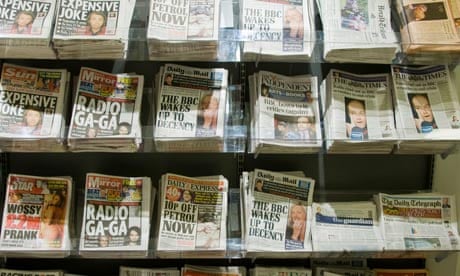The biggest newspaper groups in the country, including those that publish the Daily Mail and the Sun, have conceded they must abandon their plans to have a veto on appointments to a new press regulator if they are to get the support of the entire industry.
Through the Newspaper Society, on Thursday afternoon they announced the dropping of a proposal to veto appointments to a press watchdog they promised to set up in the wake of the Leveson inquiry.
The decision will be seen as a breakthrough effort to get the Guardian, the Financial Times and the Independent to get behind the rest of the UK press industry's audacious plans to launch a new regulator backed by the sector's royal charter and not the one proposed by the government.
Chris Blackhurst, the editor of the Independent, said it was a significant shift in position.
"I think it's a very welcome step in the right direction. I was always worried that while the veto remained in place, the charter was not transparently independent," he said.
National newspapers were virtually united in their opposition to the government charter agreed by David Cameron, Nick Clegg, Ed Miliband and Hacked Off following a late night meeting in March and last week the government agreed to delay a meeting of the Privy Council to consider it properly.
A veto on appointments was seen as a redline issue for the Guardian and the Independent, which were concerned that it would mark a return to the days of the discredited Press Complaints Commission, where appointments were influenced by executives from Daily Mail publisher Associated Newspapers and News International, owner of the Sun, Times and Sunday Times.
This veto was not specified in the government royal charter but was in the articles of association the industry was drawing up, which would establish the rules for the setting up of a new press watchdog.
The Newspaper Society made the announcement following a meeting of a steering group of newspaper executives, chaired by Paul Vickers, the group legal secretary at Trinity Mirror.
It said that appointments to the industry's proposed regulator would now be arrived at by consensus.
"The newspaper and magazine industry implementation group met today and agreed to recommend to the industry that the requirement for qualified majority voting on appointments to the board of the new regulator for the press be dropped. The implementation group will recommend instead that the appointments panel should make its decisions by consensus of its members," said Vickers, in an agreed statement.
The new press watchdog will be a self-regulator under both the government and industry plans, but its board would be dominated by non-industry members with seven independent seats and five industry boardroom seats.
However, the five largest national newspaper groups, regional papers and the magazine sector were demanding a veto as they were concerned that the appointments panel might end up opting for industry members with an agenda, such as a former editor like Brian Cathcart of Hacked Off, or would omit to appoint a member representing regional and local papers.
The government's royal charter agreed following all party talks and endorsed by parliament was due to go in front of the Privy Council on 15 May but will not now be considered until 23 May.
To contact the MediaGuardian news desk email media@theguardian.com or phone 020 3353 3857. For all other inquiries please call the main Guardian switchboard on 020 3353 2000. If you are writing a comment for publication, please mark clearly "for publication".

Comments (…)
Sign in or create your Guardian account to join the discussion